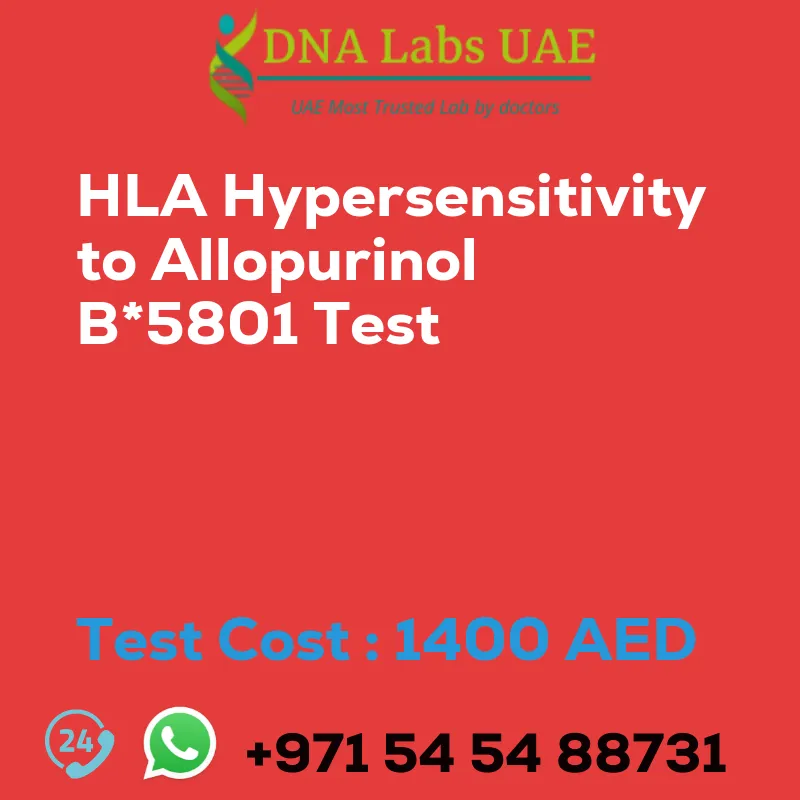HLA Hypersensitivity to Allopurinol B*5801 Test
Test Name: HLA Hypersensitivity to Allopurinol B*5801 Test
Components: PCR, Sequencing
Price: 1400.0 AED
Sample Condition: 4 mL (3 mL min.) whole blood in 1 Lavender Top (EDTA) tube OR 6 mL (3 mL min.) whole blood in 1 Yellow Top (ACD) tube OR Buccal swab collected in a sterile container. Ship refrigerated. DO NOT FREEZE.
Report Delivery: 10-12 days
Test Type: Disorders of Kidney
Doctor: Nephrologist
Test Department: Pre Test Information
No special preparation required
Test Details:
HLA hypersensitivity to allopurinol, specifically the HLA-B*58:01 allele, can be tested using genetic testing methods. This test is used to determine if an individual is at risk of developing a severe allergic reaction called Stevens-Johnson syndrome or toxic epidermal necrolysis when taking allopurinol.
The test involves analyzing a sample of the patient’s DNA, usually obtained through a blood sample or cheek swab. The DNA is then tested for the presence of the HLA-B*58:01 allele. If the HLA-B*58:01 allele is detected, it indicates an increased risk of developing a severe allergic reaction to allopurinol.
In such cases, alternative medications may be considered to manage conditions like gout, for which allopurinol is commonly prescribed.
It is important to note that this test is primarily used as a screening tool to identify individuals at higher risk. It does not guarantee that a severe reaction will occur or rule out the possibility of a reaction in those who do not have the allele. Clinical judgment and further evaluation are still necessary to make treatment decisions.
| Test Name | HLA HYPERSENSITIVITY TO ALLOPURINOL B*5801 Test |
|---|---|
| Components | |
| Price | 1400.0 AED |
| Sample Condition | 4 mL (3 mL min.) whole blood in 1 Lavender Top (EDTA) tube OR6 mL (3 mL min.) whole blood in 1 Yellow Top (ACD) tube OR Buccal swab collected in a sterile container. Ship refrigerated. DO NOT FREEZE. |
| Report Delivery | 10-12 days |
| Method | PCR, Sequencing |
| Test type | Disorders of Kidney |
| Doctor | Nephrologist |
| Test Department: | |
| Pre Test Information | No special preparation required |
| Test Details |
HLA hypersensitivity to allopurinol, specifically the HLA-B*58:01 allele, can be tested using genetic testing methods. This test is used to determine if an individual is at risk of developing a severe allergic reaction called Stevens-Johnson syndrome or toxic epidermal necrolysis when taking allopurinol. The test involves analyzing a sample of the patient’s DNA, usually obtained through a blood sample or cheek swab. The DNA is then tested for the presence of the HLA-B*58:01 allele. If the HLA-B*58:01 allele is detected, it indicates an increased risk of developing a severe allergic reaction to allopurinol. In such cases, alternative medications may be considered to manage conditions like gout, for which allopurinol is commonly prescribed. It is important to note that this test is primarily used as a screening tool to identify individuals at higher risk. It does not guarantee that a severe reaction will occur or rule out the possibility of a reaction in those who do not have the allele. Clinical judgment and further evaluation are still necessary to make treatment decisions. |








